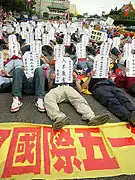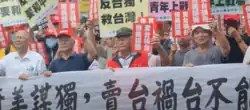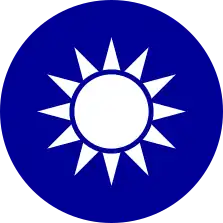Labor Party 勞動黨 | |
|---|---|
_emblem.svg.png.webp) | |
| Chairman | Wu Jung-yuan |
| Vice Chairmen |
|
| Honorary Chairman | Luo Mei-wen |
| Founded | 29 March 1989 |
| Headquarters | 6th Floor, No. 25, Lane 344, Nanjing West Road, Datong District, Taipei |
| Membership (2019) | ~400[1] |
| Ideology | |
| Political position | Left-wing[2][3] |
| Legislative Yuan | 0 / 113 |
| Municipal mayors | 0 / 6 |
| Magistrates / mayors | 0 / 16 |
| Councilors | 1 / 912 |
| Township / city mayors | 0 / 204 |
| Party flag | |
_flag.svg.png.webp) | |
| Website | |
| laborparty | |
| Labor Party | |||||||||||||||
|---|---|---|---|---|---|---|---|---|---|---|---|---|---|---|---|
| Traditional Chinese | 勞動黨 | ||||||||||||||
| Simplified Chinese | 劳动党 | ||||||||||||||
| |||||||||||||||
The Labor Party[upper-roman 1] is a left-wing political party in Taiwan, founded on 29 March 1989 by a striking trade union in Xinpu, Hsinchu County. It is part of the wider labor movement in Taiwan, and advocates for labor reforms and the redistribution of social resources. The party also supports the unification of Taiwan with mainland China, with a high level of autonomy reserved for Taiwan under the "one country, two systems" principle.
Party members often assist in unionizing workers and regularly hold protests against the government's labor policies, as well as perceived imperialism from the United States and Japan. Notable labor demonstrations that the Labor Party helped organize include the 2004 Yaowen Electric protests, 2004 Hsinta strike and 2009 labor dispute against TSMC.
History
The Labor Party was founded on 29 March 1989 by unionized workers of the Far East Synthetic Fiber Company in Xinpu, Hsinchu County.[4] The trade union had been protesting the company's mass layoffs and refusal to increase workers' wages; the protests culminated in the 1989 Far East Synthetic Fiber Company strike a month later.[4] When establishing the party, the union leadership considered adopting the name "Taiwanese Communist Party" but elected not to do so due to the widespread anti-communism in Taiwan at the time.[2][5]
In the years following its founding, the Labor Party grew in size and influence, with its membership consisting mainly of former political prisoners of the White Terror, labor movement organizers and the working class.[5] The party, however, did not see electoral success until the 2009 local elections, when Labor Party candidate Kao Wei-kai was elected to the Hsinchu County Council.[6] After Kao was elected, a majority of his monthly salary (NT$80,000) was put back into the party's treasury to fund future political activities.
In the 2018 local elections, Kao was reelected to the Hsinchu County Council, alongside Labor Party veteran Luo Mei-wen. The party won a total of two seats in the county council, representing the townships of Hukou and Xinpu.[7]
Ideology
The Labor Party's is a socialist party[2][8] which views itself as the ideological successor to the Taiwanese Communist Party.[9] The party opposes the electoral system in Taiwan, calling it a bourgeois democracy, but participates in elections nonetheless.[8]
The Labor Party opposes Taiwan independence and supports the unification of Taiwan with mainland China.[3][8]
Gallery
 May Day protest by Labor Party members in 2007
May Day protest by Labor Party members in 2007 Prominent members of the Labor Party at a public rally on 12 December 2021. From left to right: Wu Jung-yuan, Chen Shin-yuan, and Luo Mei-wen
Prominent members of the Labor Party at a public rally on 12 December 2021. From left to right: Wu Jung-yuan, Chen Shin-yuan, and Luo Mei-wen Labor Party protest in Taipei against pork imports from the United States, 12 December 2021
Labor Party protest in Taipei against pork imports from the United States, 12 December 2021 Labor Party protest in Taipei against Taiwanese independence and DPP presidential candidate Lai Ching-te, 11 August 2023
Labor Party protest in Taipei against Taiwanese independence and DPP presidential candidate Lai Ching-te, 11 August 2023
Notes
References
- ↑ "認識勞動黨:常見問與答". laborparty.tw (in Chinese (Taiwan)). Labor Party (Taiwan). Retrieved 23 June 2020.
- 1 2 3 "台湾劳动党主席吴荣元:大陆必须照顾台湾劳工-搜狐新闻". Sohu News (in Chinese). 2 March 2010. Retrieved 22 April 2020.
- 1 2 "Party Supporters Burn U.S. Flags, Hurl Eggs". Voice of Free China. Broadcasting Corporation of China. U.S. Foreign Broadcast Information Service. 2 December 1995. Retrieved 13 February 2021.
- 1 2 Lin Chun-hsiang (林群翔). "勞動黨 勞工的專屬政黨". Vitality News (in Chinese (Taiwan)). Archived from the original on 7 March 2016. Retrieved 23 April 2020.
- 1 2 "台灣勞動黨主席吳榮元:兩岸統一成功依賴誰". Sina Magazine (in Chinese (Taiwan)). Archived from the original on 2017-12-23. Retrieved 8 May 2020.
- ↑ "98年縣市議員選舉(區域) 候選人得票數" (in Chinese (Taiwan)). Central Election Commission. 5 December 2009. Archived from the original on 22 October 2014.
- ↑ "勞動黨當選2位竹縣議員 羅美文、陳新源維繫台灣左翼薪火". ETtoday (in Traditional Chinese). 24 November 2018. Retrieved 22 April 2020.
- 1 2 3 "勞動黨簡介". laborparty.tw (in Chinese (Taiwan)). Labor Party (Taiwan). Archived from the original on 30 December 2019. Retrieved 22 April 2020.
- ↑ Qin Feng (秦风). "台湾地下共产党员的命运". Guangming Daily (in Chinese). Archived from the original on 1 August 2012. Retrieved 21 April 2020.
External links
- Official website (in Chinese)
